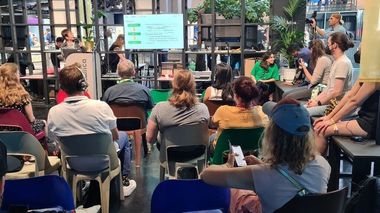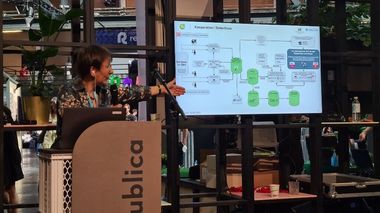Next stop: Accessibility!
The OPENER next project is a solution for the Germany-wide collection, maintenance and open provision of data regarding barriers at public transport stops. We already reported on this project in the last XTRA MILE. Encouraged by the project partners, Dr. Heike Twele, project manager at Hacon, presented OPENER next on June 10, 2022 in Berlin at the re:publica.

Heike, just very briefly: How did this project come about?
The Federal Republic's plan to establish barrier-free public transport by 2022 is a starting point for the OPENER next project. The Chemnitz University of Technology had the idea to develop an open-source application that committed citizens could use to record barriers in OpenStreetMap. In the long run, this will increase the attractiveness of public transport, and improve the quality of life for everyone. The open-source application relies on the DELFI accessibility manual, so that the data collected can be used in the information systems. As Hacon, we come into play when barriers have already been identified. The preceding steps in this process are primarily concerned with data acquisition and visualization. Once the collected data needs to be used to provide information on barrier-free travel chains, or to map transfer routes, our expertise is in demand.

What is the particular challenge?
The great challenge for transport companies and associations is providing correct and up-to-date data for an enormous number of stops across the board. It can be tackled with the crowd-sourcing approach of the project. The open-source application is integrated into OpenStreetMap (OSM). It is easy to use, and we hope to achieve a high level of acceptance among the general public. The users do not notice the challenges we face - i. e. the software creation with all interfaces and standardizations. We work closely with our project partners here.
How interested in this project was the audience at the event?
Very. The local audience showed a genuine and vital interest in this topic. Qualified follow-up questions confirmed both the great relevance of the planned measures, and the visitors’ sensitivity towards this project’s complex process. The visitors wanted to know about data protection, for example, or how app data could be updated.
How do you see the future of accessibility in public transport?
According to the voices of the re:publica auditorium, the research project should become a long-term solution - for the benefit of public transport travelers with and without mobility impairments. The recorded data can also be used for infrastructure planning.
The Chemnitz University of Technology has now published a first version of the recording app for Android, which is continuously being developed further as part of the project. The main station in Magdeburg, and the stops in the area of the local transport service in Saxony-Anhalt and in Chemnitz are planned for the pilot operation. When the route networks at the stops are recorded, we can show the transfer routes for different user groups in detail in HAFAS. A future extension that includes tariff and real-time information is also possible. Additional input functions such as opening hours are also to be added.
If this project can be implemented nationwide, I see great potential for reducing travel barriers, promoting integration, and supporting the mobility transformation.
Latest News: German Mobility Award 2022 for OPENERnext
OPENERnext is the winner of the German Mobility Award in the category "Data and Innovation". Together with our project partners, we are delighted to have been awarded one of the most important prizes in the field of digitization and mobility in Germany. It honors innovative projects that rethink and reshape the future of mobility. And that is what we do every day.
The award ceremony by Daniela Kluckert, Parliamentary State Secretary at the Federal Minister for Digital Affairs and Transport, took place on October 27, 2022 in Berlin.

